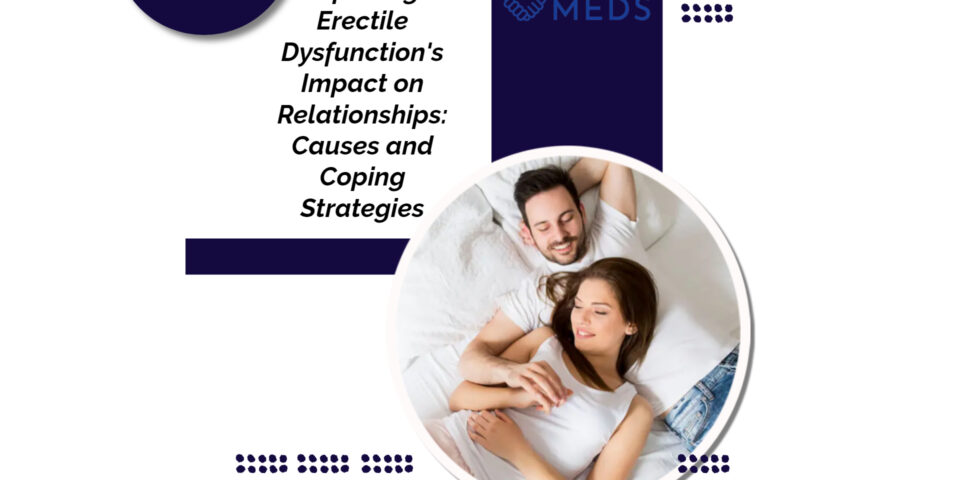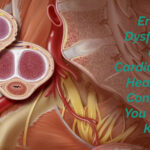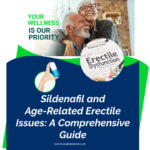Introduction
Erectile Dysfunction (ED) is a topic that affects many individuals and their relationships, yet it’s often shrouded in silence and stigma. In this comprehensive guide, we’ll delve into the intricate aspects of ED, from its causes to its impact on relationships, and most importantly, how couples can navigate this challenging terrain together.
Understanding Erectile Dysfunction (ED)
Definition and Prevalence
Erectile Dysfunction, commonly known as impotence, is a persistent condition characterized by the inability to attain or sustain an erection suitable for engaging in sexual intercourse. It’s more common than you might think, affecting over 30 million men in the United States alone. But it’s essential to recognize that ED is not just a “men’s issue“; it has far-reaching consequences for both partners in a relationship.
Importance of addressing ED
Ignoring the issue or sweeping it under the rug can lead to further complications in a relationship. Openly addressing ED is not only beneficial but necessary for the health of your partnership. Let’s start by exploring the causes of ED and why it’s crucial to address them.
The Causes of Erectile Dysfunction
Erectile Dysfunction can be caused by a variety of factors, often intertwined. Understanding these causes is the first step in addressing the issue effectively.
Physical Factors
Heart conditions and ED
Conditions like atherosclerosis, which affect blood flow, can lead to ED. The connection between a healthy heart and a satisfying sex life is more significant than you might imagine.
Hormonal imbalances
Hormonal disparities, particularly reduced testosterone levels, can have a substantial impact on the development of Erectile Dysfunction (ED). Ensuring hormonal equilibrium is vital for maintaining sexual function.
Medications and ED
Certain medications, like antidepressants and blood pressure drugs, can have side effects that contribute to ED. It’s essential to consult with your healthcare provider if you suspect medication is the culprit.
Psychological Factors
Stress, anxiety, and depression
Mental health is closely linked to sexual function. Stress, anxiety, and depression can create a vicious cycle of ED, as they often lead to performance anxiety and self-doubt.
Relationship issues
The dynamics of a relationship can significantly impact sexual health. Unresolved conflicts, lack of emotional intimacy, or communication breakdown can contribute to ED.
Body image and self-esteem
Low self-esteem or body image issues can undermine confidence in the bedroom. Feeling good about oneself is key to a satisfying sexual relationship.
Lifestyle Factors
Smoking and ED
The harmful effects of smoking extend to sexual health. Nicotine and other toxins can damage blood vessels, leading to ED.
Alcohol and substance abuse
Excessive alcohol and drug use can lead to both temporary and long-term ED. Substance abuse often masks underlying emotional or psychological issues.
Sedentary lifestyle and diet
A lack of physical activity and a poor diet can lead to obesity and other health problems, which are often correlated with ED. Making healthier lifestyle choices can make a significant difference.
Understanding these causes allows individuals and couples to identify the root of the problem and work towards solutions. However, addressing ED’s emotional toll on relationships is equally important.
The Emotional Toll on Relationships
ED goes beyond the physical challenges and can take a profound emotional toll on a relationship.
Communication Breakdown
Importance of open dialogue
One of the most critical aspects of coping with ED is open communication. Creating a safe space to discuss concerns and feelings is essential for both partners.
Breaking the stigma
Society often attaches shame to ED, making open discussions difficult. However, it’s crucial to break the stigma surrounding it and encourage a supportive environment.
Emotional Disconnect
Loss of intimacy and affection
ED can lead to a loss of physical intimacy and affection. It’s vital to find alternative ways to connect emotionally and maintain a sense of closeness.
Impact on overall relationship satisfaction
The impact of ED goes beyond the bedroom. It can lead to dissatisfaction in the relationship as a whole, affecting everything from trust to overall happiness.
Frustration and Resentment
Coping strategies for both partners
Both partners need strategies to cope with the frustration and resentment that can develop. Support, understanding, and patience are key.
Seeking professional help
When emotional tolls become overwhelming, seeking the guidance of a therapist or counselor can be transformative for both individuals and the relationship.
Coping Strategies for Couples [Erectile Dysfunction Treatment]
Coping with ED as a couple involves a multi-faceted approach, addressing both the physical and emotional aspects of the issue.
Seeking Medical Help
Consultation with a healthcare provider
If you suspect physical factors are contributing to ED, consult with a healthcare provider. They can evaluate your health and recommend appropriate treatments.
Medications and therapies
Medications like Viagra and Cialis can be highly effective. These drugs enhance blood flow to the penis, promoting erections. Other therapies, like vacuum devices and injections, are also available.
Certain drugs can help with remaining in bed, such as cenforce d 160 mg and kamagra polo 100mg.
Lifestyle Changes
Healthy diet and exercise
Maintaining a healthy weight and an active lifestyle can improve sexual function. A diet rich in fruits, vegetables, and whole grains can also have a positive impact.
Smoking and alcohol cessation
Quitting smoking and moderating alcohol consumption can be transformative for individuals dealing with ED. These lifestyle changes often lead to improved overall health.
Psychological Support
Individual and couples therapy
Individual therapy can help address psychological factors contributing to ED, such as anxiety or self-esteem issues. Couples therapy can strengthen communication and emotional intimacy.
Mindfulness and relaxation techniques
Practicing mindfulness and relaxation exercises can reduce anxiety and stress, creating a more conducive environment for intimacy.
Relationship Strengthening
Building emotional intimacy
Working on emotional connection and understanding is paramount. Simple gestures of affection and support can go a long way in reigniting the spark in your relationship.
Rekindling romance and connection
Exploring new ways to express love and affection can rekindle the romance in your relationship. Try new activities together, go on date nights, and keep the flame burning.
Real-Life Stories: Coping with ED as a Couple
John and Jane: Overcoming ED with communication
John and Jane’s relationship faced a significant challenge when John started experiencing ED. They decided to confront the issue head-on by openly discussing their feelings and seeking medical help. Through communication and understanding, they were able to find solutions and strengthen their bond.
Mike and Lisa: Finding hope through medical solutions
Mike and Lisa’s journey with ED led them to explore various medical treatments. With the guidance of healthcare providers, they found a solution that worked for them. This experience not only restored their physical intimacy but also brought them closer emotionally.
David and Sarah: Reconnecting emotionally
David and Sarah found themselves emotionally distant due to ED affecting their intimacy. They decided to seek couples therapy, which not only addressed the physical aspects of ED but also helped them reconnect emotionally. Their relationship flourished as a result.
Conclusion
Erectile Dysfunction can be a challenging issue to navigate, but it doesn’t have to be a relationship-killer. Understanding the causes, addressing the emotional toll, and implementing coping strategies can make a significant difference. Remember, the key is to approach ED as a team, and together, you can strengthen your relationship.
In the FAQs section, we address some common questions about ED and its impact on relationships.
FAQs
Q1: What is the main cause of erectile dysfunction?
A1: Erectile dysfunction can be caused by a combination of physical, psychological, and lifestyle factors. Common causes include heart conditions, stress, and smoking.
Q2: How can couples cope with the emotional toll of ED?
A2: Couples can cope by maintaining open communication, seeking medical help, and focusing on emotional intimacy. Therapy and support are also vital.
Q3: Are there any natural remedies for ED?
A3: Some natural remedies may help, but it’s crucial to consult with a healthcare provider. These remedies may include dietary changes and exercise.
Q4: Is ED a common issue in relationships?
A4: Yes, ED is relatively common and can affect relationships at different levels. Addressing it promptly is essential for maintaining a healthy partnership.
Q5: Does erectile dysfunction affect relationships?
A5: Yes, erectile dysfunction can affect relationships by causing intimacy and communication issues.
Q6: Do men with erectile dysfunction avoid relationships?
A6: Some men with erectile dysfunction may avoid relationships due to concerns about their condition, but not all do.
Q7: How to deal with dating someone with erectile dysfunction?
A7: Support, communication, and patience are key when dating someone with erectile dysfunction.



